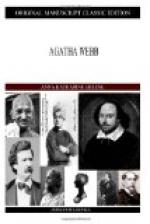“Dead!” he murmured. “Dead! John and James Zabel. What will happen next? Is the town under a curse?” And he fell on his knees before the prostrate form of James, only to start up again as he saw the eyes of Knapp resting on him.
“Ah,” he muttered, “the detective!” And after giving the man from Boston a close look he turned toward Mr. Fenton.
“You said something about this good old man having killed Agatha Webb. What was it? I was too dazed to take it in.”
Mr. Fenton, not understanding the young man’s eagerness, but willing enough to enlighten him as to the situation, told him what reasons there were for ascribing the crime in the Webb cottage to the mad need of these starving men. Sweetwater listened with open eyes and confused bearing, only controlling himself when his eyes by chance fell upon the quiet figure of the detective, now moving softly to and fro through the room.
“But why murder when he could have had his loaf for the asking?” remonstrated Sweetwater. “Agatha Webb would have gone without a meal any time to feed a wandering tramp; how much more to supply the necessities of two of her oldest and dearest friends!”
“Yes,” remarked Fenton, “but you forget or perhaps never knew that the master passion of these men was pride. James Zabel ask for bread! I can much sooner imagine him stealing it; yes, or striking a blow for it, so that the blow shut forever the eyes that saw him do it.”
“You don’t believe your own words, Mr. Fenton. How can you?” Sweetwater’s hand was on the breast of the accused man as he spoke, and his manner was almost solemn. “You must not take it for granted,” he went on, his green eyes twinkling with a curious light, “that all wisdom comes from Boston. We in Sutherlandtown have some sparks of it, if they have not yet been recognised. You are satisfied”—here he addressed himself to Knapp—“that the blow which killed Agatha Webb was struck by this respectable old man?”
Knapp smiled as if a child had asked him this question; but he answered him good-humouredly enough.
“You see the dagger lying here with which the deed was done, and you see the bread that was bought from Loton with a twenty-dollar bill of Agatha Webb’s money. In these you can read my answer.”
“Good evidence,” acknowledged Sweetwater—“very good evidence, especially when we remember that Mr. Crane met an old man rushing from her gateway with something glittering in his hand. I never was so beat in my life, and yet—and yet—if I could have a few minutes of quiet thought all by myself I am certain I could show you that there is more to this matter than you think. Indeed, I know that there is, but I do not like to give my reasons till I have conquered the difficulties presented by these men having had the twenty-dollar bill.”
“What fellow is this?” suddenly broke in Knapp.
“A fiddler, a nobody,” quietly whispered Mr. Fenton in his ear.




